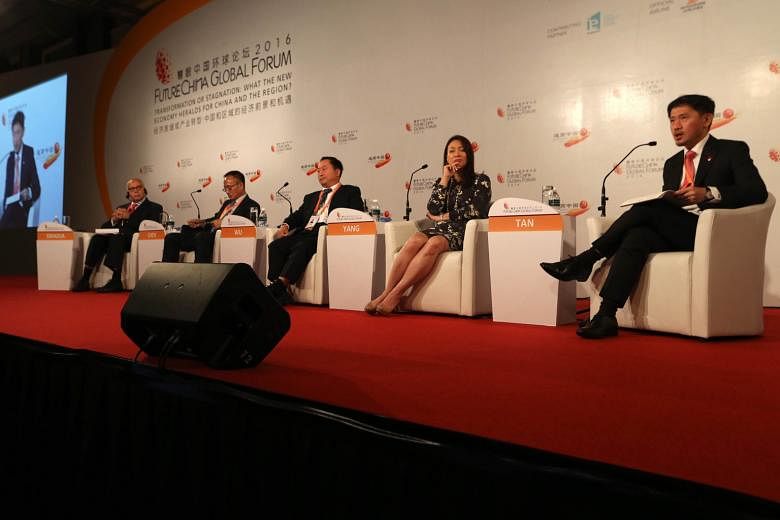Despite fears of a slowdown in spending, the appetite of the Chinese middle class for consumption will keep growing.
Mr Liang Xinjun, chief executive of Chinese conglomorate Fosun Group, told a panel at the FutureChina Global Forum that he was bullish on consumer spending, which has underpinned Fosun's acquisition strategy.
When asked if consumer confidence would be affected by slower growth, Mr Liang noted that China experienced reforms in the early 2000s which resulted in the shrinking of the employed labour force by several millions.
In the context of China's huge workforce, the several million workers expected to be affected by ongoing reforms in industries like coal and steel is a small figure that would not affect consumer confidence, he said.
In fact, all the evidence in recent years points to resilient middle-class spending despite talk of China's economic slowdown, he added, citing 15 to 30 per cent growth in sectors such as healthcare and leisure.
The Fosun Group has made several high-profile foreign acquisitions, betting on China's burgeoning middle class and its taste for leisure spending.
Last year, it acquired French holiday company Club Med and Canadian entertainment company Cirque Du Soleil.
Mr Liang said the firm had invested in resorts in South-east Asia, citing "explosive growth in Chinese outbound tourism in Japan and Korea", a trend he said would head towards South-east Asia and Australia.
He also addressed the negative perceptions around Chinese overseas acquisitions, advising companies to make more local hires to reduce cultural friction.
Mr Tan Teck Long, group head of large corporates and chief operating officer of institutional banking at DBS, said that much of China's overseas investment was aimed at taking Western products and services back to China, citing Pirelli's creation of a specialist tyre business in China after the Italian tyre maker was acquired by ChemChina.
He added that Chinese companies were reliant on financing overseas acquisitions through bank loans, which presented opportunities for Singapore.
"Singapore's fund-raising capability is there - an efficient and effective capital market which allows us to raise funds cheaply for Chinese companies," said Mr Tan.
"Unique to Singapore, we are a centre for products such as business trusts. We have business trusts in areas such as ports, data centres and even real estate for Germany and Japan... It can help Chinese companies solve the problem of de-leveraging their debt when they are doing overseas acquisitions because trusts are a form of equity without the company losing control over their assets."
Chinese outbound investment has been growing sharply. Panellist Timothy Stratford, a Beijing-based managing partner at law firm Covington and Burling, noted the sky-rocketing growth of Chinese outbound investment. Between 2002 and 2007, Chinese investment in the United States grew by 52 per cent, but between 2008 and 2013, it expanded by 631 per cent.


